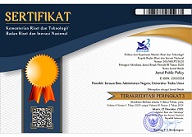Budaya Kerja dan Disiplin Kerja dalam Mewujudkan Kepuasan Kerja Pegawai di Sekretariat Daerah Kabupaten Agam
Abstract
Work culture aims to create employee effectiveness and efficiency at work. The realization of this must be supported by the existence of good employee work discipline. This will give satisfaction to employees. However, there are still many employees who do not understand the work culture in the institutions they work for, apart from that delays in employee attendance that often occur without strict sanctions cause problems not only for the employees themselves, but also disrupt cooperation between employees in carrying out their duties and responsibilities. which has been given. This study aims to prove whether or not the influence of work culture and work discipline variables on employee job satisfaction at the Regional Secretariat of Agam Regency is present or not. The research method used in this research is survey-based quantitative. The sample was determined using a total sampling technique. The research instrument used was a questionnaire that had been tested for validity and reliability. The collected data were analyzed using the T test and F test. Based on the results of the research that had been done, it was found that there was an influence of work culture and work discipline variables either partially or simultaneously on job satisfaction which could be trusted to be 100% correct. The results of the research which states that the influence of the independent variable on the dependent variable requires affirmation of work culture and strict enforcement of work discipline towards employees. It aims to make employees feel satisfied at work, so that it will have an impact on their effective and efficient work results.
Keywords
Full Text:
PDFReferences
Afandi, P. (2018). Manajemen Sumber Daya Manusia. Pekan Baru: Penerbit Zanafa Publishing.
Afianto, I. D., & Utami., H. N. (2017). Pengaruh Disiplin Kerja dan Komunikasi Organisasi terhadap Kepuasan Kerja dan Kinerja Karyawan (Studi pada Karyawan Divisi Marketing PT. Victory International Futures Kota Malang). Jurnal Administrasi Bisnis, 50(6). Diambil dari http://administrasibisnis.studentjournal.ub.ac.id.
Chan, S. C. H. (2019). Participative leadership and job satisfaction: The mediating role of work engagement and the moderating role of fun experienced at work. Leadership & Organization Development Journal. https://doi.org/10.1108/LODJ-06-2018-0215
Creswell, J. W. (2010). Research Design: Pendekatan Kualitatif, Kuantitatif dan Mixed. Yogyakarta: Pustaka Pelajar.
Dwiyono, Y. (2017). The Effect of leadership style, professional competence, and work didscipline toward work effectiveness. International Conference on Education and Technology (2017 ICEduTech), 144, 126–130.
Fathoni, A. (2006). Manajemen Sumber Daya Manusia. Jakarta: PT Rineka Cipta.
Frinaldi, A. (2014). Pengaruh Budaya Kerja Pegawai Negeri Sipil Terhadap Pelayanan Publik di Dinas Catatan Sipil dan Kependudukan Kota Payakumbuh. Humanus, 13(2), 180–192. https://doi.org/10.24036/jh.v13i2.4727
Frinaldi, A. (2017). Mengelola Budaya Organisasi dan Budaya Kerja. Padang: UNP Press.
Frinaldi, A., & Embi, M. A. (2013). Budaya Kerja ‘Giot Ipas’ dalam Kalangan Pegawai Negeri Sipil Etnik Mandailing (Studi Kasus pada Kabupaten Pasaman Barat, Provinsi Sumatera Barat). Jurnal Ilmiah Ilmu-Ilmu Humaniora.
Frinaldi, A., & Putri, N. E. (2020). The influence of Work Culture and Work Quality on Service Quality in 50 Kota Regency, West Sumatera. Advances in Social Science, Education and Humanities Research, 50, 361–370.
Garg, K., Dar, I. A., & Mishra, M. (2017). Job Satisfaction and Work Engagement: A Study Private Sector Bank Managers. Advances in Developing Human Resource, 1–14.
Gorda, I. (2004). Manajemen Sumber Daya Manusia (Revisi Cetakan Kedua). Denpasar: Astabrata.
Hasibuan, M. P. (2013). Manajemen Sumber Daya Manusia. Jakarta: PT Bumi Aksara.
Hofstede, G. (1997). Culture and Organization. Software on Mind. Intercultural Coperation and Its Importance for Survival. New York: Mcgraw-Hill.
Judge, T. A., HM, W., Mueller, M. K., & C.L, H. (2017). Job Attitudes, Job Satisfaction, and Job Affect: A Century of Continuity amd of Change. Advance online publication. https://doi.org/10.1037/apl0000181
Khuzaeni, M. I., Djumahir, & Solimun. (2013). The influence of Work Culture, Work Stress to the Job Satisfaction and Employees Performance in the State Treasury Service in Jakarta, Indonesia. IOSR Journal of Business and Management, 9(2). Diambil dari www.iosrjournal.org
Lee, A., Willis, S., & Tian, A. W. (2017). Empowering leadership: A meta-analytic examination of incremental contribution, mediation, and moderation. Journal of Organizational Behavior, 39(3), 1–20.
Luthans, F. (2013). Organizational Behaviour (McGraw Hill Education (Terjemahan)). Jakatra: PT Indeks.
Mangkunegara, A., A. A. (2011). Manajemen Sumber Daya Manusia Perusahaan (Edisi Revisi, Cetakan Kesepuluh). Bandung: PT Remaja Rosdakarya Offset.
Nawawi, H. (2006). Evaluasi dan Manajemen Kinerja di Lingkungan Perusahaan dan Industri. Yogyakarta: Gadjah Mada University Press.
Prayogi, M., & Nursidin, M. (2019). Pengaruh Kompetensi dan Disiplin Kerja terhadap Kinerja Karyawan. Jurnal Festifal Riset Ilmiah Manajemen dan Akuntansi 1, 11, 1–5.
Strauss, S., & Sayles, S. (2012). Kepemimpinan dalam Organisasi. Jakarta: Prenhallindo.
Sugiyono, S. (2013). Metode Penelitian Kuantitatif, Kualitatif dan R&D. Bandung: Alfabeta.
Sugiyono, S. (2017). Metode Penelitian Kuantitatif, Kualitatif dan R&D. Bandung: Alfabeta.
Susanty, A., & Baskoro, S. W. (2013). Pengaruh Motivasi Kerja Dan Gaya Kepemimpinan Terhadap Disiplin Kerja serta Dampaknya pada Kinerja Karyawan (Studi Kasus Pada PT. PLN (Persero) APD Semarang). Jati Undip : Jurnal Teknik Industri, 7(2), 77–84. https://doi.org/10.12777/jati.7.2.77-84
Weiss, H. M. (2002). Deconstructing job satisfaction: Separating evaluation, beliefs and effective experience. Human Resource Management review, 12, 173–195.
DOI: https://doi.org/10.35308/jpp.v7i1.3307
Refbacks
- There are currently no refbacks.
Copyright (c) 2021 Malini Syaftia Rahmawati, Aldri Frinaldi
p-ISSN: 2477-5738 I e-ISSN: 2502-0528 I DOI: 10.35308
Jl. Alue Peunyareng, Ujong Tanoh Darat, Meureubo, Kabupaten Aceh Barat, Aceh 23681, Indonesia
(0655) 7110535 l +621260313742 l +6285277110911
 is licensed under a Creative Commons Attribution-ShareAlike 4.0 International License
is licensed under a Creative Commons Attribution-ShareAlike 4.0 International License


